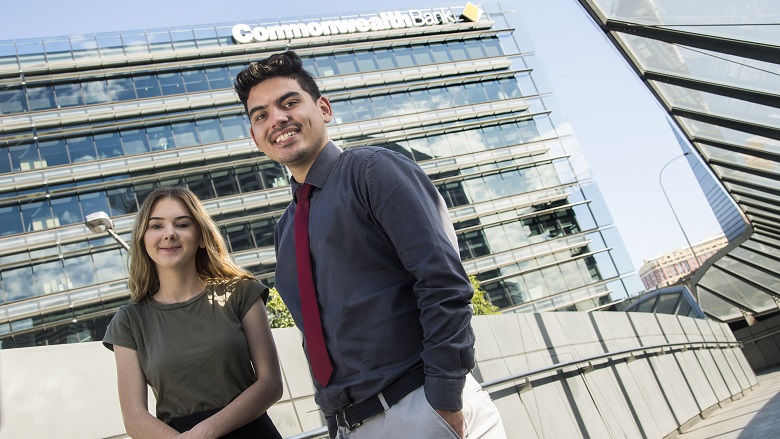When Jake Haapu was growing up on the Central Coast of New South Wales, he never expected he would end up working in the tech industry.
Like most teenagers of his age, he didn’t have a specific idea of where his immediate career would take him. After graduating from high school he started applying for jobs in construction and hospitality, but became increasingly frustrated with the lack of opportunities.
“At the time I was unemployed and not getting any feedback from my job applications,” said Mr Haapu. “It seemed like I just wasn’t being given a chance to prove myself.”
But those prospects changed after a chance encounter with a family friend who recommended he apply for the CBA Enterprise Services Indigenous Trainee Program.
Jake, a Wiradjuri man, was accepted into the 2018 intake and seized the chance to explore a new field.
“I had no idea about this line of work,” added Mr Haapu, who has just accepted a full-time role as an Associate Analyst at CBA. “If it wasn’t for this opportunity, I wouldn’t be working in this area at all.”
“Since joining, I’ve never looked back.”
Jake is part of a small but growing number of young, Indigenous Australians changing the make-up Australia’s tech industry.
Despite making up three per cent of the national population, Aboriginal and Torres Strait Islander people are underrepresented in the technology sector, accounting for less than one per cent of those enrolled to study Information Technology (IT)[1] - a key pipeline for talent within the industry.
To help close this gap, Enterprise Services – CBA’s technology division – set out to boost the number of Indigenous employees working in tech.
Following the launch of a pilot project in 2016, the program welcomed its first official intake a year later. Close to 30 trainees have now passed through the program, with many continuing to build their careers in IT at CBA in areas as diverse as robotics, automation and cyber security.
The 12-month program offers on-the-job training, mentoring as well as certified skills, giving trainees industry-recognised qualifications once they finish.
To help attract trainees, CBA partners with Indigenous organisations and community groups to identify candidates with strong values and motivations but who might not have thought about or had the opportunity to pursue a career in tech.
The program, which is part of CBA’s Reconciliation Action Plan (RAP) and aims to have Aboriginal and Torres Strait Islander people’ employees make up at least three per cent of its Australian workforce by December 2026, is already paying off.
Another unique part of the program is its focus on developing skills for tech roles that will be in high-demand in the future, according to Jane Adams, CBA’s General Manager of ES Transformation.
“We understand that future is in technology and the jobs of tomorrow will look very different to what they do now,” said Ms Adams.
“Because of this, we have taken a different approach to our traditional traineeship offering and ensured we are supporting these people to gain the skills, experience and technological know-how to take us into the future.”
Liam Ridgeway, the co-founder of the Indigenous tech community hub Indigitek agrees.
“The program provides ongoing opportunities for Indigenous Australians to explore STEM roles in one of Australia’s largest and most innovative companies, and will contribute towards the steady growth of Indigenous STEM practitioners,” said Mr Ridgeway.
Jake is also upbeat and continues to excel, having just been named a finalist for the Trainee of the Year for New South Wales – something he attributes to the support he received through the program.
“Coming into this new corporate environment was really different to what I’m used to and my mentors and bosses made sure I became confident,” he said.
“It wasn’t anything to do with the particular training or area I was in, it was down to the people that trained me.”
[1] Dept. of Education and Training, 2018.



